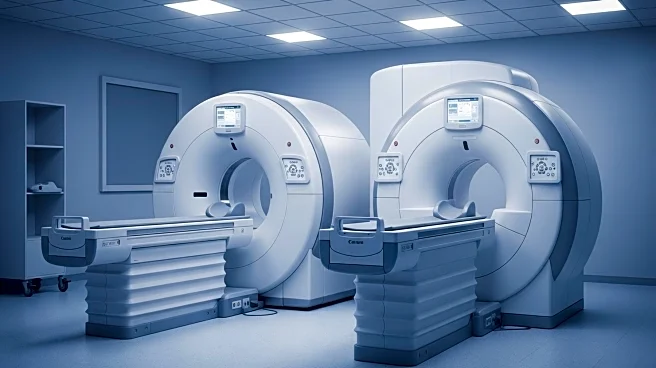What is the story about?
What's Happening?
Royal Philips, a leader in health technology, has introduced new advancements in radiation oncology at the American Society for Radiation Oncology (ASTRO) 2025 Annual Meeting. The company unveiled the Philips Rembra RT and Areta RT CT platforms, along with the helium-free BlueSeal RT 1.5T MR system. These innovations aim to improve the accuracy and efficiency of radiation therapy, offering advanced workflows and long-term value. The Rembra RT and Areta RT systems enhance cancer treatment planning by providing clearer images and faster image reconstruction speeds, while the BlueSeal RT system, powered by AI-based SmartSpeed Precise software, offers enhanced simulation confidence and sustainability.
Why It's Important?
These technological advancements by Philips are significant for the field of radiation oncology, as they address the growing demand for precision and efficiency in cancer treatment planning. The new systems are designed to help healthcare providers deliver more accurate and patient-centered care, potentially improving treatment outcomes. By integrating AI and sustainable practices, Philips is setting new standards in radiation therapy, which could lead to reduced costs and improved patient experiences. The innovations also support remote collaboration, allowing care teams to stay connected and efficient without additional staffing.
What's Next?
Philips is exploring opportunities to integrate MVision AI's Contour+ AI-powered auto-segmentation software with its CT simulators, including the new Rembra RT and Areta RT systems. This collaboration could further enhance the precision of radiation therapy planning. Additionally, Philips is expanding its MR leadership with the introduction of BlueSeal RT in North America, aiming to transform therapy planning with enhanced simulation confidence and sustainability. These developments may lead to broader adoption of Philips' technologies in radiation oncology departments, potentially influencing industry standards.
Beyond the Headlines
The introduction of helium-free MR systems by Philips represents a shift towards more sustainable practices in medical imaging. This innovation not only reduces environmental impact but also lowers operational costs for healthcare facilities. The use of AI in radiation therapy planning highlights the growing role of technology in healthcare, offering potential improvements in treatment accuracy and efficiency. As Philips continues to innovate, the company may influence the future direction of radiation oncology, encouraging other industry players to adopt similar sustainable and AI-driven approaches.


















